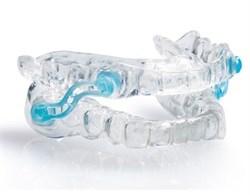A solution to poor sleep patterns, caused by sleep apnoea and excessive snoring, can be found at the dentist. These sleep disturbances are a cause of fatigue and frustration not only for the sufferers, but also for their sleeping partners.
The fatigue and depression accompanying poor quality sleep are also causes for a loss of productivity in the workplace, as well as industrial and traffic accidents. Regular sleep disturbances can also cause a number of life-threatening medical conditions including high blood pressure, heart attack, diabetes, stroke and even in severe cases, death.
"Sleep apnoea sufferers experience daytime fatigue because their nervous system never goes into the stage of deep sleep necessary for rest and relaxation," says Dr Ronel Podde, a Pretoria based dentist supplying sleep devices to sleep apnoea sufferers. "Without knowing it, sleep apnoea sufferers may stop breathing momentarily up to 600 times per night. Breathing usually starts again with an explosive noise, also causing their sleeping partners to wake up to some degree."
Muscles relax during deep sleep, including the muscles usually keeping the airway open. As a result, the airway either narrows severely or temporarily collapses, causing breathing to stop. When breathing ceases, the nervous system, designed to ensure survival, wakes the body up just enough to resume breathing but not necessarily enough to make the sleeper aware of the problem.
"Many jokes are made about excessive snoring but not many people realise that it might be an indicator of a more serious underlying cause. Even if sleep apnoea isn't present, the disturbance in sleep for those who share a sleeping space with the snorer usually leads to great frustration in relationships."
Solutions for excessive snoring and sleep apnoea usually involve sleep studies, overnight Electroencephalogram (EEG), Continuous Positive Airway Pressure (CPAP) therapy or surgery. Although effective, these treatment procedures tend to be costly and risky, in the case of surgery.
"Great advances have been made in the area of devices that aid the deep sleep necessary for relaxation and restoration. We prescribe a device called Silent Nite for patients suffering from sleep apnoea or excessive snoring and eight out of 10 patients find that the device brings an immediate end to their suffering."
The device, made from a soft inner layer encased by a hard protective layer, is custom fabricated to ensure a comfortable fit. The device moves the lower jaw into a forward position, increasing space in the airway tube and reducing the soft tissue vibration known as the snoring noise.
While the idea of sleeping with a device in the mouth might sound strange to some, the solution provided by treatment traditionally prescribed is significantly more intrusive and potentially cumbersome.
"A number of ENT specialists have referred patients to us to be fitted with the device and the success rate has been phenomenal. A good night's sleep is within closer reach than many people realise. Better sleep can be a reality, rather than just a Christmas wish or a new year's resolution," concludes Dr Podde.










































